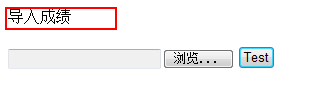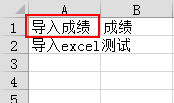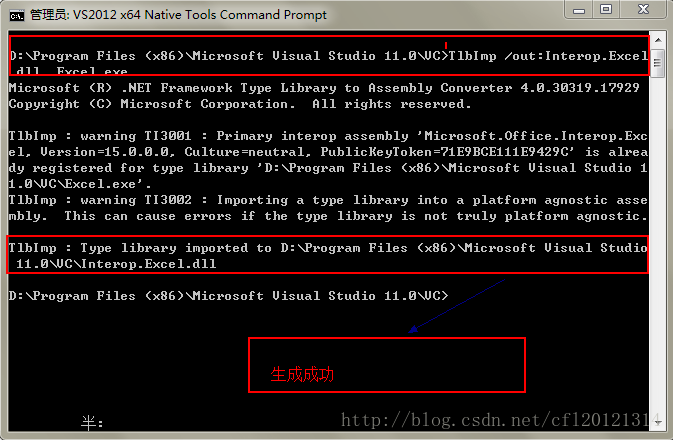.Net之路(十四)com组件、OLEDB导入EXCEL
.NET com组件
这种方法在计算机没有安装office套件时,也是能够使用的。所以不依赖于软件,
但是还是需要xcel.exe编译后的dll文件打包到相应的程序中来引用。这样将dll文件“
随身携带”,就可以了。还是挺不错的!
1.注册Microsoft.Office.Interop.Excel.dll
在office安装文件夹下找到excel.exe,路径D:\Program Files(x86)\Microsoft
Office\Office15.将excel.exe文件复制到D:\ProgramFiles (x86)\Microsoft Visual
Studio 11.0\VC下。用visual studio 2012命令行工具切换到D:\Program Files
(x86)\Microsoft Visual Studio11.0\VC,一般会自动切换。这时候执行TlbImp /
out:Interop.Excel.dll Excel.exe。提示
2.引用interop.excel.dll
将编译好的dll文件复制到程序的bin文件下。添加引用
下面是我自己做的一个小demo。
<pre name="code" class="csharp">private void OpenExcel(string strFileName)
{
object missing = System.Reflection.Missing.Value;
Microsoft.Office.Interop.Excel.Application excel = new Microsoft.Office.Interop.Excel.Application();//lauch excel application
if (excel == null)
{
}
else
{
excel.Visible = false; excel.UserControl = true;
// 以只读的形式打开EXCEL文件
Workbook wb = excel.Application.Workbooks.Open(strFileName, missing, true, missing, missing, missing,
missing, missing, missing, true, missing, missing, missing, missing, missing);
//取得第一个工作薄
Worksheet ws = (Worksheet)wb.Worksheets.get_Item(1);
//取得总记录行数 (包括标题列)
int rowsint = ws.UsedRange.Cells.Rows.Count; //得到行数
//int columnsint = mySheet.UsedRange.Cells.Columns.Count;//得到列数
//取得数据范围区域 (不包括标题列)
Range rng1 = ws.Cells.get_Range("B2", "B" + rowsint); //item
Range rng2 = ws.Cells.get_Range("K2", "K" + rowsint); //Customer
object[,] arryItem= (object[,])rng1.Value2; //get range's value
object[,] arryCus = (object[,])rng2.Value2;
//将新值赋给一个数组
string[,] arry = new string[rowsint-1, 2];
for (int i = 1; i <= rowsint-1; i++)
{
//Item_Code列
arry[i - 1, 0] =arryItem[i, 1].ToString();
//Customer_Name列
arry[i - 1, 1] = arryCus[i, 1].ToString();
}
//Response.Write(arry[0, 0] + " / " + arry[0, 1] + "#" + arry[rowsint - 2, 0] + " / " + arry[rowsint - 2, 1]);
}
excel.Quit(); excel = null;
Process[] procs = Process.GetProcessesByName("excel");
foreach (Process pro in procs)
{
pro.Kill();//没有更好的方法,只有杀掉进程
}
GC.Collect();
}
结果


OLEDB方式
这种方式就像平时使用sqlserver一样,将excel文件当成一个数据源来对待。只不过
这时候的数据库是excel罢了,其实一样简单来看sqlserver也就是复杂化的excel所以这
种方式相对还是
比较常见的。
code
<pre name="code" class="csharp">/// <summary>
/// 读取Excel数据到DS
/// </summary>
/// <param name="excelName">xls文件路径(服务器物理路径)string RootDir =Server.MapPath(System.Web.HttpContext.Current.Request.ApplicationPath.ToString());//获取程序根目录</param>
/// <returns></returns>
public DataSet ExcelReader(string excelName)
{
// 拼写连接字符串,打开连接
string strConn = "Provider=Microsoft.ACE.OLEDB.12.0;" + "data source=" + excelName + ";Extended Properties='Excel 8.0; HDR=YES; IMEX=1'";
OleDbConnection objConn = new OleDbConnection(strConn);
objConn.Open();
// 取得Excel工作簿中所有工作表
DataTable schemaTable = objConn.GetOleDbSchemaTable(OleDbSchemaGuid.Tables, null);
OleDbDataAdapter sqlada = new OleDbDataAdapter();
DataSet ds = new DataSet();
// 遍历工作表取得数据并存入Dataset
foreach (DataRow dr in schemaTable.Rows)
{
string strSql = "Select * From [" + dr[2].ToString().Trim() + "]";
OleDbCommand objCmd = new OleDbCommand(strSql, objConn);
sqlada.SelectCommand = objCmd;
sqlada.Fill(ds, dr[2].ToString().Trim());
}
objConn.Close();
return ds;
}
几个关键code句:
c#的垃圾回收:
//得到excel所有的进程
Process[] procs = Process.GetProcessesByName("excel");
foreach (Process pro in procs)
{
pro.Kill();//
}
GC.Collect();
com组件创建excel操作对象
Microsoft.Office.Interop.Excel.Application excel = new Microsoft.Office.Interop.Excel.Application(); //以只读的形式打开EXCEL文件
Workbook wb = excel.Application.Workbooks.Open(strFileName, missing, true, missing, missing, missing, missing, missing, missing, true, missing, missing, missing, missing, missing);
//取得第一个工作薄
Worksheet ws = (Worksheet)wb.Worksheets.get_Item(1);
//取得单元格的值
String cellstr = ws.Cells[i][j].Value;
oledb建立excel连接
// 拼写连接字符串,打开连接
string strConn = "Provider=Microsoft.ACE.OLEDB.12.0;" + "data source=" + excelName + ";Extended Properties='Excel 8.0; HDR=YES; IMEX=1'";
OleDbConnection objConn = new OleDbConnection(strConn);
objConn.Open();
// 取得Excel工作簿中所有工作表
DataTable schemaTable = objConn.GetOleDbSchemaTable(OleDbSchemaGuid.Tables, null);
第一种方法是创建excel对象,第二种方法是以excel为数据源。第一种的适用面更
广。还有一种是用二进制数据流的方式来读取,需要将excel文件转成csv文件。
.NET com组件
这种方法在计算机没有安装office套件时,也是能够使用的。所以不依赖于软件,
但是还是需要xcel.exe编译后的dll文件打包到相应的程序中来引用。这样将dll文件“
随身携带”,就可以了。还是挺不错的!
1.注册Microsoft.Office.Interop.Excel.dll
在office安装文件夹下找到excel.exe,路径D:\Program Files(x86)\Microsoft
Office\Office15.将excel.exe文件复制到D:\ProgramFiles (x86)\Microsoft Visual
Studio 11.0\VC下。用visual studio 2012命令行工具切换到D:\Program Files
(x86)\Microsoft Visual Studio11.0\VC,一般会自动切换。这时候执行TlbImp /
out:Interop.Excel.dll Excel.exe。提示
2.引用interop.excel.dll
将编译好的dll文件复制到程序的bin文件下。添加引用
下面是我自己做的一个小demo。
<pre name="code" class="csharp">private void OpenExcel(string strFileName)
{
object missing = System.Reflection.Missing.Value;
Microsoft.Office.Interop.Excel.Application excel = new Microsoft.Office.Interop.Excel.Application();//lauch excel application
if (excel == null)
{
}
else
{
excel.Visible = false; excel.UserControl = true;
// 以只读的形式打开EXCEL文件
Workbook wb = excel.Application.Workbooks.Open(strFileName, missing, true, missing, missing, missing,
missing, missing, missing, true, missing, missing, missing, missing, missing);
//取得第一个工作薄
Worksheet ws = (Worksheet)wb.Worksheets.get_Item(1);
//取得总记录行数 (包括标题列)
int rowsint = ws.UsedRange.Cells.Rows.Count; //得到行数
//int columnsint = mySheet.UsedRange.Cells.Columns.Count;//得到列数
//取得数据范围区域 (不包括标题列)
Range rng1 = ws.Cells.get_Range("B2", "B" + rowsint); //item
Range rng2 = ws.Cells.get_Range("K2", "K" + rowsint); //Customer
object[,] arryItem= (object[,])rng1.Value2; //get range's value
object[,] arryCus = (object[,])rng2.Value2;
//将新值赋给一个数组
string[,] arry = new string[rowsint-1, 2];
for (int i = 1; i <= rowsint-1; i++)
{
//Item_Code列
arry[i - 1, 0] =arryItem[i, 1].ToString();
//Customer_Name列
arry[i - 1, 1] = arryCus[i, 1].ToString();
}
//Response.Write(arry[0, 0] + " / " + arry[0, 1] + "#" + arry[rowsint - 2, 0] + " / " + arry[rowsint - 2, 1]);
}
excel.Quit(); excel = null;
Process[] procs = Process.GetProcessesByName("excel");
foreach (Process pro in procs)
{
pro.Kill();//没有更好的方法,只有杀掉进程
}
GC.Collect();
}
结果
OLEDB方式
这种方式就像平时使用sqlserver一样,将excel文件当成一个数据源来对待。只不过
这时候的数据库是excel罢了,其实一样简单来看sqlserver也就是复杂化的excel所以这
种方式相对还是
比较常见的。
code
<pre name="code" class="csharp">/// <summary>
/// 读取Excel数据到DS
/// </summary>
/// <param name="excelName">xls文件路径(服务器物理路径)string RootDir =Server.MapPath(System.Web.HttpContext.Current.Request.ApplicationPath.ToString());//获取程序根目录</param>
/// <returns></returns>
public DataSet ExcelReader(string excelName)
{
// 拼写连接字符串,打开连接
string strConn = "Provider=Microsoft.ACE.OLEDB.12.0;" + "data source=" + excelName + ";Extended Properties='Excel 8.0; HDR=YES; IMEX=1'";
OleDbConnection objConn = new OleDbConnection(strConn);
objConn.Open();
// 取得Excel工作簿中所有工作表
DataTable schemaTable = objConn.GetOleDbSchemaTable(OleDbSchemaGuid.Tables, null);
OleDbDataAdapter sqlada = new OleDbDataAdapter();
DataSet ds = new DataSet();
// 遍历工作表取得数据并存入Dataset
foreach (DataRow dr in schemaTable.Rows)
{
string strSql = "Select * From [" + dr[2].ToString().Trim() + "]";
OleDbCommand objCmd = new OleDbCommand(strSql, objConn);
sqlada.SelectCommand = objCmd;
sqlada.Fill(ds, dr[2].ToString().Trim());
}
objConn.Close();
return ds;
}
几个关键code句:
c#的垃圾回收:
//得到excel所有的进程
Process[] procs = Process.GetProcessesByName("excel");
foreach (Process pro in procs)
{
pro.Kill();//
}
GC.Collect();
com组件创建excel操作对象
Microsoft.Office.Interop.Excel.Application excel = new Microsoft.Office.Interop.Excel.Application(); //以只读的形式打开EXCEL文件
Workbook wb = excel.Application.Workbooks.Open(strFileName, missing, true, missing, missing, missing, missing, missing, missing, true, missing, missing, missing, missing, missing);
//取得第一个工作薄
Worksheet ws = (Worksheet)wb.Worksheets.get_Item(1);
//取得单元格的值
String cellstr = ws.Cells[i][j].Value;
oledb建立excel连接
// 拼写连接字符串,打开连接
string strConn = "Provider=Microsoft.ACE.OLEDB.12.0;" + "data source=" + excelName + ";Extended Properties='Excel 8.0; HDR=YES; IMEX=1'";
OleDbConnection objConn = new OleDbConnection(strConn);
objConn.Open();
// 取得Excel工作簿中所有工作表
DataTable schemaTable = objConn.GetOleDbSchemaTable(OleDbSchemaGuid.Tables, null);
第一种方法是创建excel对象,第二种方法是以excel为数据源。第一种的适用面更
广。还有一种是用二进制数据流的方式来读取,需要将excel文件转成csv文件。
